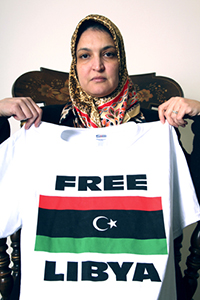Libyan native reflects on country’s civil war

Libyan Education graduate student Amal Laba displays a shirt calling to free Libya Wednesday. Amal hopes to be able to return to her country and teach once she finishes her degree at Kent State University. Photo by Thomas Song.
November 29, 2012
Amal Laba hasn’t seen her family since early 2011.
Laba, a Kent State graduate student, is a Libyan native; her family experienced the country’s recent civil war firsthand.
With the death of Libyan leader Muammar Gaddafi and a country consumed for nearly two years of civil warfare, the people of Libya are now on their way to a democratic government.
“My mother, for example, went for the first time in her life to vote about [three] months ago,” Laba said. “She was so happy. She felt she has a voice to give for her country and that she is responsible for her country.”
Laba’s immediate family lives near Tripoli, the capital of Libya, and close to all the unrest caused by civil rights protests. She said her family stayed in that house near Tripoli throughout the entire war and what they experienced is unforgettable.
Laba said her parents were too old to participate in any of the rebel protests so they mostly stayed inside if there wasn’t an important reason to go outside. She said sometimes they wouldn’t have water or electricity for many days. Going out to get food was also difficult because of the protests and increasing food prices.
Egypt’s revolution, which occurred only a month earlier than the Libyan conflict, inspired the upheaval of Laba’s homeland. The war is still affecting the country of Mali and its government, said associate history professor Timothy Scarnecchia, whose expertise includes African history.
Some of Gaddafi’s soldiers were from Mali, so when it was clear that Gaddafi’s forces were going to lose against the rebels, they went back to Mali and took their Libyan weapons, Scarnecchia explained.
“They then quickly defeated the Malian army based in the north because the Mali army was not well-equipped and not able to defend themselves,” Scarnecchia said. “The army then began a coup in the capital of Bamako, and they overthrew the government.”
Because Gaddafi was much more influential south of Libya, Scarnecchia said “it’s kind of like a power vacuum that’s created when a powerful dictator is killed or removed.”
“What happened in Libya isn’t just about Libya. What’s happening in Mali is like a fall out of what happened in Libya,” he said. “And it’s a pretty big deal.”
After 45 years under the rule of Gaddafi, Libyans have the chance to speak out freely about who they think should lead their country and many are taking advantage of this opportunity, Laba said.
“It was a very nice experience for [Libyans] because they have never been part of an election process before,” Laba said. “It’s something special for them.”
Laba explained that Libyans were so excited to have a voice in the election of their future politicians that some posted pictures of their voter cards on Facebook to show off.
Although much of the fighting is over, Laba said security is still a big issue in her country.
Many people, rebels and anti-rebels, have obtained military guns or heavy artillery because weaponry holds were looted and open for months during the war. Libyan officials are trying to collect the stolen weapons in exchange for rewards, but the people will not give up their weapons until a president is chosen, Laba said.
“If they don’t agree with the president chosen by the National Congress, there will be a conflict,” she said.
The National Congress is the elected legislature of Libya. The council is supposed to agree on the country’s future president and vice president.
Another security issue that concerns Laba is “escaped” prisoners. While Gaddafi was fighting the rebels, he went to local prisons, paid the prisoners to fight for his name and they were released.
The dispersed amount of heavy artillery mixed in with hard criminals makes the country very unstable, she said.
Although she hasn’t seen her family since the war’s outbreak, Laba speaks to her family every few days to check in and verify information she reads in American newspapers.
It may take a long time for Libya to be able to function properly, she said, but it is taking all the right steps and has high hopes for her country.
Contact Brittney Trojanowski at [email protected].











